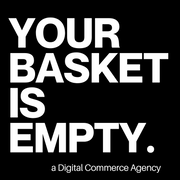With Tom Rees, Founder of Wiro Agency 🔥
WIRO are an award-winning and industry- leading ecommerce agency delivering long term, high value growth for their clients. Services include CX + strategy combined with Shopify Plus development, to create awesome D2C ecommerce sites.
For a short period WIRO are offering a FREE quick win, including analysis, enhancement suggestions + a design concept to one key ecommerce area, based on industry-leading, best UX practice. Simply head to their site: wiro.agency/free-quick-win
1. What is Shopify Editions and what are your first impressions?
Shopify Editions is where twice a year Shopify showcase 100+ updates across all of the platform. Including new and exciting features, changes to functionality, new abilities for partners in their eco-system, merchants and customers.
There’s some really exciting features, both on the consumer side (which previously had issues and lack of function surrounding pre-ordering functionality, the ability to receive multiple discounts at checkout and many more customer frustrations). It’s exciting to see new functions solving these issues, as well as on the merchant side, with new and improved admin abilities, including Shopify Functions, Checkout Extensibility and enhancements Metafields!
There looks to be lots of Shopify Plus exclusives, which is awesome for some of the enterprise level brands. However, Shopify have done an awesome job at rolling most updates out to the wider eco-system so that those on the lower Shopify plans can benefit from the updates.
2. What are your top 5 feature developments and why?
Discount Combinations – Finally, you can now combine discounts on the same order, making it easy to launch promotions that win new customers, get repeat business, and increase conversions This has been a frustration of mine, personally - as well as many of our clients on Shopify, so a great move to finally deploy this as competitors like WooCommerce, have been doing similar for years.
Pre-Ordering – Shopify has recently introduced various Shopify Checkout supported apps for: Pre-orders, subscriptions, and try before you buy - that are fully integrated into its platform. Allowing brands to sell more and give your customers the flexible purchase options they actually want. For years, partners, agencies, merchants and our clients have struggled with pre-order functionality and finding workarounds within Shopify’s standard platform. Theres no single solution for pre-orders for merchants therefore Shopify have made the wise choice to partner with the partner ecosystem and host a bunch of apps on the app store, 2 good options are Pre-Order Manager and Purple Dot. In my opinion, I’d prefer to see this built into Shopify’s platform directly, without the need for third party apps, allowing you to tailor the preferences, similar to discount codes.
B2B – You now have the option of running both sides of your business (D2C & B2B) from a single online store (for both your direct and wholesale customers). Shopify now also allows you to choose to manage your wholesale channel from a dedicated expansion store that’s customised specifically to your B2B business and only used by your wholesale customers. Whichever you choose, you can manage it all from the same place, saving you time, resource and obviously money. With new ‘Company’ customers, you can provide B2B customers with distinct contact permissions, payment terms, price lists, and tax exemptions. For your more complex buyers, you can assign multiple contacts and locations to a single profile, with different permissions. Personally, I love this. It’s something we get asked all of the time from clients, I would like to see this introduced on the Advanced Shopify plan instead of being a Shopify Plus Exclusive, even if some of the ability was restricted or limited.
Hydrogen + Oxygen – Shopify’s Headless Solution and Stack allowing partners and agencies to build fast storefronts with a React-based framework. Hydrogen gives you pre-built components, web-hooks and utilities that map directly to Shopify’s APIs, to accelerate the development process. Allowing to deploy with one click on Oxygen, (Shopify’s Headless hosting solution). Again, another Shopify Plus exclusive, but an awesome one! The Headless approach to ecommerce is becoming more common and often the solution is one explored when rebuilding or re-platforming from other ecom providers.
Shopify Functions – Shopify Plus brands now get exclusive abilities to create and write their own ‘Functions’ and distribute them to their store in a custom app. So, if a specific use-case isn’t yet available in the Shopify App Store, or if the use case is too niche or advanced for the general public, Shopify Plus brands can simply build the functionality that they need themselves. Essentially, unlocking the backend of Shopify to allow developers to extend or replace key parts of Shopify’s backend logic, with custom code. Providing the flexibility of open source, which has limitless possibility... but does for me, brings extreme risk to Shopify with the potential of falling in the trap of other legacy ecommerce platforms.
3. Are there any limitations of Shopify Editions?
Duplication Content Pages – A common thing we get asked by clients is, “we used to be able to duplicate our content pages and targeted landing pages on WooCommerce, can we do it on Shopify”. I still think theres room for growth within the simple page and navigation section within the online store within Shopify for both merchants and for partners to quick duplicate content pages. We get asked to regularly generate and create landing pages from clients from partner agencies, where most of the content is replicated, only changing the CTA’s, but without it being a ‘product’ you simply cant ‘duplicate’.
Limitations to Product Variants – A common frustration among our developers and when working with clients is around the limitations to product variants, when it comes to customisation of product options. As a team, we need to get creative when it comes to solutions that accommodate how our clients businesses systematically operate, therefore having limitations to variants (when trying to create product builders, if only using variants) instead of a custom app or solution, becomes difficult.
